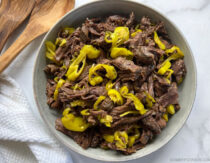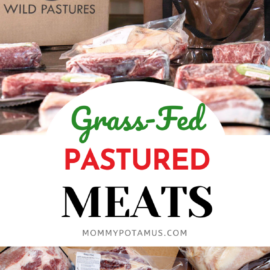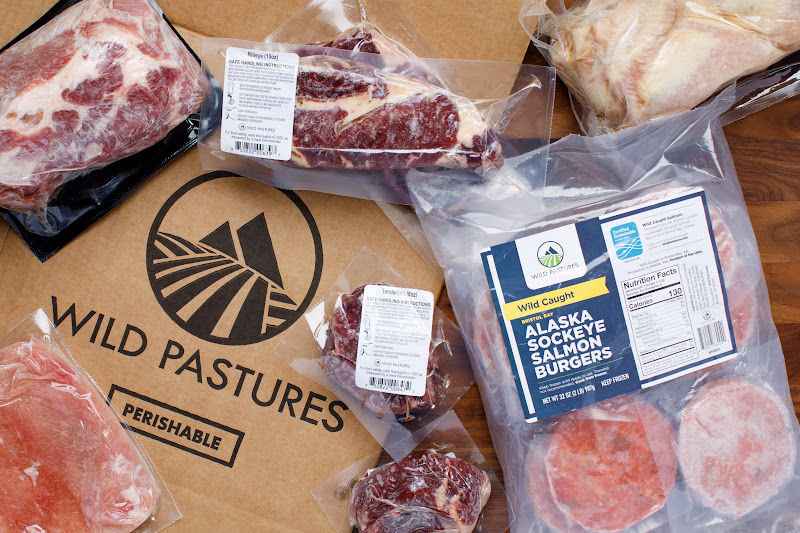
When I lived near Nashville, I didn’t just know my farmer . . . I could text him special requests for specific cuts of meat before meeting up at the farmers market. In the beach town where I live now, though, most of the meat options are expensive, very limited in variety, and localish at best.
That’s why when I heard that the founders of PaleoValley started a new, AFFORDABLE regenerative meat delivery service called Wild Pastures . . . well, I immediately placed an order. They offer truly grass-fed beef, pasture-raised chicken, pasture-raised pork and wild-caught seafood – all top quality, and all at wholesale prices.
My first box arrived with staples for some of our favorite meals like Mississippi pot roast and chicken tikka masala, plus some things I can’t get locally, like beef chorizo and truly pasture-raised pork sausage.
If you’re wondering what regenerative farming is and how it’s possible to deliver high quality meat at Costco prices, read on. Wild Pastures does things differently, and those differences benefit the nutrient density of our food, our grocery budget, and the environment.
Labeling Loopholes Explained
When my firstborn Katie was a baby, I drove hours to buy grass-fed beef directly from local farmers. I shook their hands and chatted with their littles before loading everything into a cooler and making the long drive home. That was the only way to do it back then.
Unfortunately, when big companies noticed the huge demand for pasture-raised, quality meat, they took advantage of labeling loopholes to make their products seem healthier for us (and the planet) than they actually are. We started seeing labels like “free range,” which seems to suggest happy chickens clucking away in large fields of grass.
As you probably know, the reality is much different. The “USDA considers five minutes of open-air access each day to be adequate for it to approve use of the ‘Free Range’ claim on a poultry product,” and the access area is not required to have any vegetation. (1)
Though organic does ensure that some important standards are met – organic feed and the restriction of antibiotics, for example – depending on the source the conditions can be virtually identical to conventional factory farms. Oh, and, the FDA restricts the use of hormones in ALL chicken raised in the U.S., so the “raised without hormones” label found on many packages doesn’t really tell us anything about how the chicken was truly raised. Hormones are approved for both meat and dairy cows, though, so that is something to be aware of.
Even meat labeled “grass-fed” is often not what it seems. Some grass-fed beef farmers spray their fields with pesticides/herbicides and/or use synthetic fertilizers. They can also start their cows on grass and then transition them to grains – which don’t necessarily have to be organic or non-GMO – and then still label the beef as grass-fed.
Feeding cows grains significantly alters the number of “total nutrients, phytonutrients, antioxidants, key fatty acids, vitamins, minerals, protein, and amino acids” found in beef. (2)
Bottom Line: Labeling loopholes make it challenging to figure out exactly what kind of meat we’re really buying . . . often at a premium! That’s why I’m so excited about Wild Pastures – they’re raising the bar for quality while staying committed to affordable pricing.
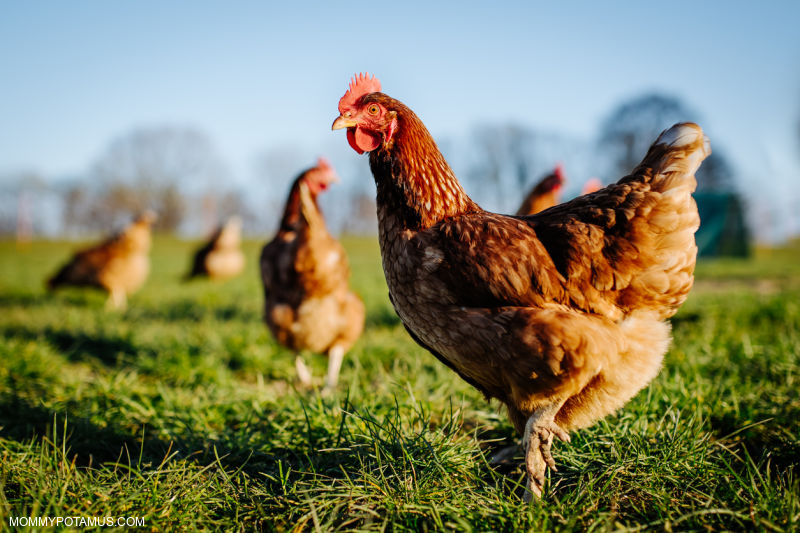
Truly Pasture-Raised Meats (Not Misleading Labels)
Because of how misleading labels can be, some farmers have started using the term “regenerative farming” to describe practices that:
- Nourish our precious (and rapidly depleting) topsoil with rotational grazing practices
- Raise livestock according to their nature (OUTSIDE with a species appropriate diet)
- Yield the most nutrient-dense meat possible for our families
Wild Pastures works exclusively with small family farms that use these practices to mimic natural ecosystems, help restore soil health, and sequester carbon from the atmosphere. They never use chemicals on their pastures, and they’re fully transparent about how their animals are raised . . . because they’re proud of it, and they should be.
- Grass-Fed Beef – Cows are raised on 100% grass using rotational grazing practices to provide optimal nutrients while supporting soil health. All beef is American Grassfed Association certified.
- Pasture-Raised Pork – Pigs spend their lives on pasture, foraging and eating grass and non-GMO foods like turnips, squash and apples. They are never confined and all pork is American Grassfed Association certified.
- Pasture-raised chicken – Chickens are raised in small flocks on a non-GMO diet of bugs and forage, which makes them nutrient-dense and more flavorful. They have access to pasture all day (for the majority of the daylight hours) and are brought indoors at night and during poor weather conditions. (As someone who has raised chickens, I like this approach because it keeps them safe from nighttime predators.)
- Wild-Caught Seafood — They source their salmon from Bristol Bay, Alaska. It’s not a pasture, but it is home to the world’s most sustainable salmon run. They also offer wild caught Alaskan cod.
When discussing why they source exclusively from the U.S., they explain that “there are less than 60 years, or harvests, left of quality nutrients in our soil according to the renowned U.N. study you may have already heard about.”
As a parent, the idea that our children could be inheriting soil that is virtually depleted of nutrients is deeply concerning, and I’m grateful for the chance to support Wild Pastures’ mission to make a meaningful positive impact for not just our children, but for their children and beyond.
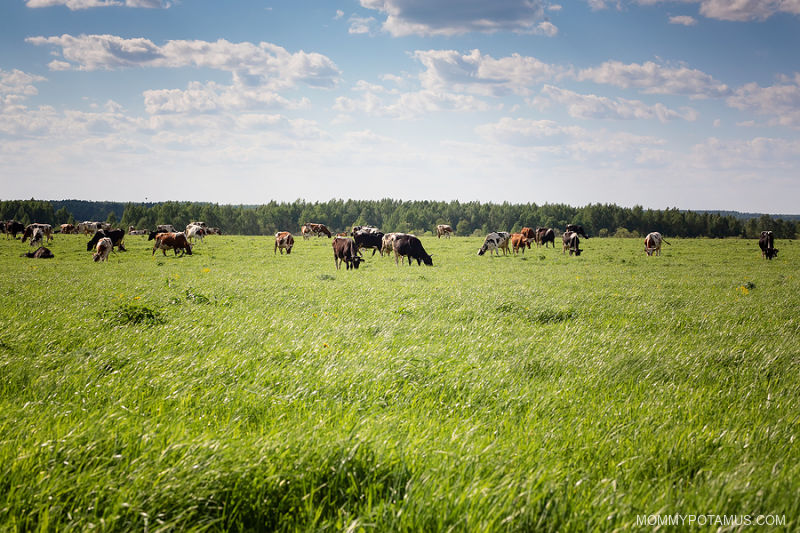
Whole Use, Zero Waste
As part of their commitment to sustainability, Wild Pastures has created a zero waste policy, which means they make every effort to use as much of the entire animal as possible. To accomplish that they partner with their sister company, PaleoValley, which carefully dries the organ meats for use their Grass Fed Organ Complex. Some of the meat is also used to produce these delicious beef sticks. They send the tallow to their Boulder, Colorado restaurant, Wild Pastures Burger, along with some of the meat.
Wild Pastures also tries to minimize shipping and packaging, too. While they can ship on dry ice anywhere in the continental United States, their goal is to deliver locally as much as possible. They have hubs all around the U.S. to minimize freight distance, and they use recyclable and reusable tote bags, too.
Wholesale Pricing
If you’re wondering how Wild Pastures maintains such high standards while keeping prices 25-40% lower than their competition . . . well, same! After chatting with them here’s what I learned:
In addition to being better for the environment, their whole use approach is a big part of keeping costs down.
Also, since they only sources from U.S. family farms, they don’t have to pay a premium to import meat from other countries. They further reduce costs by using regional hubs to minimize shipping distances . . . and then they pass the savings from all three of those strategies on to customers.
They could charge more, but they’ve opted instead to make it as affordable as possible so they can make the biggest impact on families, the environment, and the U.S. agricultural system possible.

How It Works
- Choose from one of two box sizes (Approximately 15 or 25 pounds)
- Customize your box if desired (If there’s something you don’t love in the standard box, you can swap it for something else)
- Choose your delivery frequency (Every 4 Weeks, 6 Weeks, 2 Months, or 3 Months. You can also order without becoming a subscriber. The discount isn’t as deep and you do have to pay a $4.99 shipping fee, but it’s still a great deal.)
- Easily change your delivery date in case you are out of town or need to delay your order for any reason
Right now Wild Pastures is offering an amazing deal for new subscribers:
- 20% Off For Life
- Free Shipping
- Additional $15 Off Your First Order
Click here to order Wild Pastures
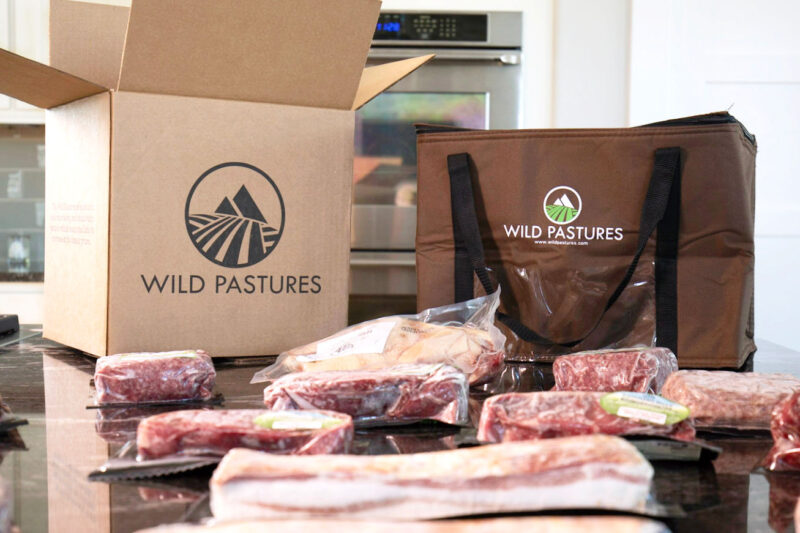
Frequently Asked Questions
Is their meat certified organic?
Here’s what they say:
Thank you so much for your interest in Wild Pastures! While we are not certified organic, our farms and processors are certified by the American Grassfed Association, and Global Animal Partnership Certified. Our pastures and the practices utilized by our farmers are actually “beyond organic.”’ Our farmers do not spray their pastures with pesticides or herbicides nor do they feed the animals anything other than what is best for them their entire lives.
Unfortunately, “organic” beef, pork, and chicken can still come from animals fed corn and imported soy. Our farmers also use rotational grazing to ensure that the cows are on fresh pasture. They also practice this for the pigs and chickens as well. This method mimics the natural grazing patterns of grazing animals in the wild.
The funny thing is, Certified Organic beef is not required to be rotationally grazed or grazed at all for that matter. Another reason we do not certify organic is due to the exorbitant cost associated with certification. We had to decide between being able to supply certified organic meat that costs more or one that was made by farmers utilizing beyond organic standards that we could provide to consumers for less.
If we paid for all the organic certifications which would be each pasture, each processor, each packing facility, and the labeling, we would not be able to offer the amazing prices we do, which isn’t feasible for most consumers. Our priority is to get high quality food into as many hands as possible in a cost effective way which is why we opted out of the certification. We can assure you, though, that our farmers take the utmost care to provide an incredibly clean product that goes far beyond organic.”
On a personal note, most of the local farms I’ve purchased from over the years used organic practices but did not pursue certification because of the cost. They welcomed curious customers (like me) who wanted to verify that their practices truly were organic, and I’m happy to support them.
One farming couple we knew in Nashville is actually starting a farm about an hour from our home in Florida, and I can’t wait to visit. They welcomed our dairy goats into their herd when we relocated and I’m so excited to see them again . . the couple and the goats!
Can you recap their standards in a nutshell?
- ALL meat raised regeneratively
- 100% non-GMO
- ALL domestically raised on American family farms
- Beef and pork is all AGA (American Grassfed Association) certified
- Chicken is certified regenerative
- All animals are rotationally grazed
Click here to learn more about Wild Pastures or place an order
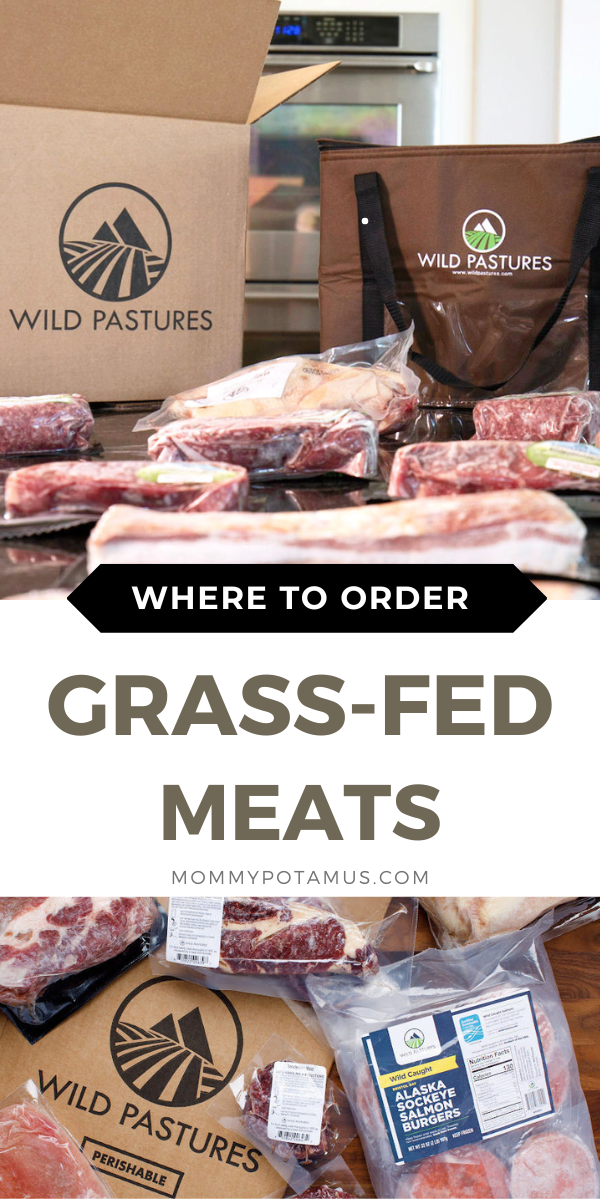
Sources
- Certified Humane (2014) “Free Range” and “Pasture Raised” officially defined by HFAC for Certified Humane® label
- Understanding Agriculture. Study: Grass-Fed Beef Healthier, More Nutritious

